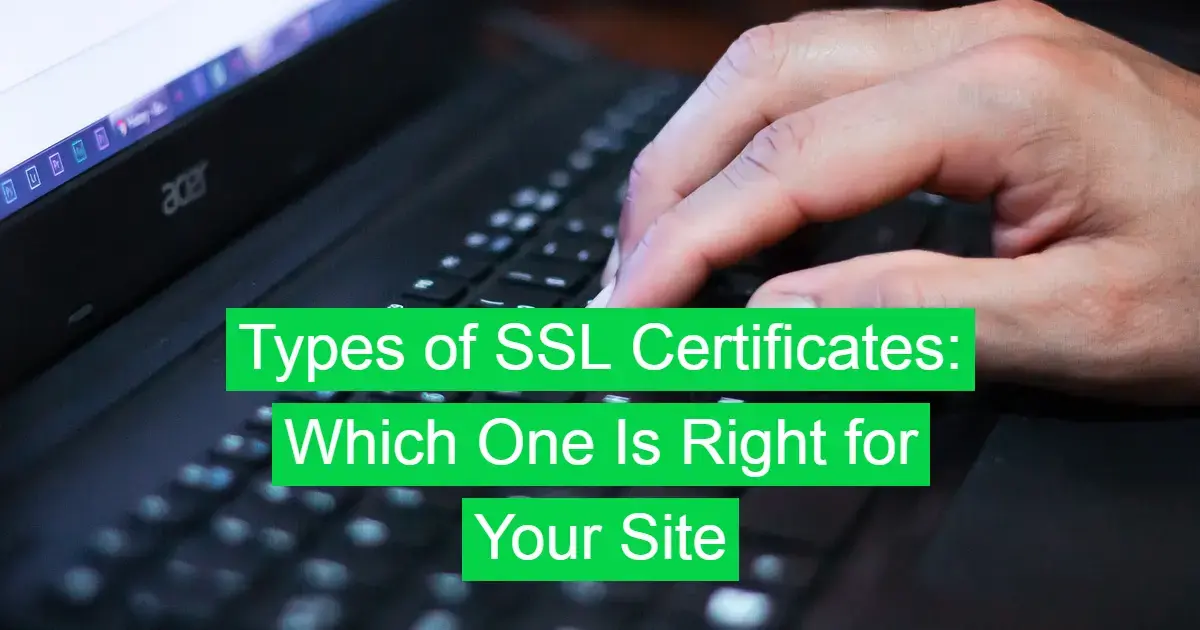When using websites these days, especially in submitting forms or buying anything, security is paramount. For website owners, this means ensuring the confidentiality and integrity of data transmitted between their site and its visitors. This is where SSL certificates come in. In this article, you’ll learn about the types of SSL certificates out there, as well as which one is right for your website.
What is a SSL Certificate?
An SSL certificate is a digital certificate that authenticates a website's identity and enables an encrypted connection. SSL stands for Secure Sockets Layer, a security protocol that creates an encrypted link between a web server and a web browser. This link ensures that all data transmitted between the web server and browser remains private and secure.
SSL certificates are issued by trusted third-party organizations called Certificate Authorities (CAs). When a website requests an SSL certificate, the CA verifies the website's identity and domain name ownership before issuing the certificate. This process ensures that the website is legitimate and not a phishing site trying to steal user information.
SSL certificates contain information such as the website's domain name, the certificate issuer, the certificate's validity period, and the website's public key. The public key is used to encrypt data sent to the website, and the website's private key is used to decrypt the data. This ensures that only the website can read the data sent to it.
When a user visits a website with an SSL certificate, their browser automatically checks the certificate's validity. If the certificate is valid, the browser establishes an encrypted connection with the website. This is indicated by the padlock icon in the browser's address bar and the "https://" prefix in the website's URL.
Understanding the Basics of SSL Certificates
Before diving into the different types, let's understand the core function of an SSL certificate. Imagine you're sending a postcard through the mail. Anyone can read the message on the postcard as it travels through the postal system. This is similar to how unencrypted data travels across the internet – it's vulnerable to eavesdropping. An SSL certificate acts like an envelope, encrypting your message (data) so that only the intended recipient (the website server) can open and read it.
SSL certificates achieve this encryption through a process called public key cryptography. Each certificate contains a public key and a private key. The public key is shared with the browser, which uses it to encrypt the data. Only the server possessing the corresponding private key can decrypt the data. This ensures that even if someone intercepts the communication, they cannot decipher the information without the private key.
Beyond encryption, SSL certificates also provide authentication. They verify the identity of the website, assuring visitors that they are connecting to the legitimate website and not a fake one. This is crucial in preventing phishing attacks and building trust with your users. A website with a valid SSL certificate displays a padlock icon in the browser's address bar, often accompanied by "https://" at the beginning of the URL. This visual cue signals a secure connection to visitors.
Types of SSL Certificates based on Validation Level
SSL certificates are categorized based on their validation level, which determines the extent to which the Certificate Authority (CA) verifies the identity of the certificate holder. There are three main validation levels:
- Domain Validated (DV) Certificates
- Organization Validated (OV) Certificates
- Extended Validation (EV) Certificates
Domain Validated (DV) Certificates
DV certificates offer the lowest level of validation. The CA only verifies that the applicant owns the domain name. This is typically done through an automated process, such as sending an email to the domain's registered email address or placing a specific file on the website's web hosting server. DV certificates are quick and easy to obtain, making them a popular choice for small businesses, blogs, and personal websites where sensitive data isn't regularly exchanged.
Example: A personal blog where the owner shares their thoughts and experiences. Since no user data is collected beyond maybe an email address for subscriptions, a DV certificate provides sufficient security.
Organization Validated (OV) Certificates
OV certificates provide a higher level of validation than DV certificates. The CA verifies the identity and physical address of the organization applying for the certificate. This involves checking business registration documents, verifying phone numbers, and sometimes even contacting the organization directly. OV certificates are suitable for businesses and organizations that handle sensitive customer information, such as e-commerce websites, online payment platforms, and lead generation sites.
Example: An online store selling handmade jewelry. Because the website processes customer orders and collects payment information, an OV certificate is essential to establish trust and ensure secure transactions.
Extended Validation (EV) Certificates
EV certificates offer the highest level of validation. The CA performs a thorough background check on the organization, verifying its legal existence, physical address, and operational legitimacy. EV certificates are typically used by large corporations, government agencies, and organizations that handle highly sensitive data, such as financial institutions, healthcare providers, and e-commerce giants. EV certificates provide the strongest assurance of website authenticity and are often displayed with a green address bar, prominently displaying the organization's name.
Example: A large bank's online banking portal. Given the sensitive financial information handled, an EV certificate is crucial for building user confidence and protecting against phishing attacks. The green address bar reinforces the site's legitimacy.
Types of SSL Certificates based on the Number of Domains Covered
SSL certificates are also categorized based on the number of domains or subdomains they cover:
Single Domain Certificates
Wildcard Certificates
Multi-Domain (SAN/UCC) Certificates
Single Domain Certificates
The single domain certificates secure only one specific domain name, such as www.example.com. They cannot be used to secure other subdomains (example - blog.example.com) or other domains (example - example.net). Single domain certificates are suitable for websites with a single, clearly defined online presence.
Example: A small business website, www.nileflores.com, which only has one online presence and doesn't use subdomains.
Wildcard Certificates
Wildcard certificates secure a domain and all its subdomains. For example, a wildcard certificate for *.example.com would secure www.example.com, blog.example.com, mail.example.com, and any other subdomain under example.com. Wildcard certificates are ideal for organizations with multiple subdomains or those that plan to add subdomains in the future.
Example: A university website, www.university.edu, which uses subdomains like students.university.edu, faculty.university.edu, and alumni.university.edu. A wildcard certificate simplifies SSL management for all these subdomains.
Multi-Domain (SAN/UCC) Certificates
Multi-Domain certificates, also known as Subject Alternative Name (SAN) or Unified Communications Certificates (UCC), can secure multiple distinct domain names and/or subdomains with a single certificate. This is useful for organizations that own multiple websites or have different brands under one umbrella. SAN certificates are commonly used for securing Microsoft Exchange servers and other unified communication platforms.
Example: A company that owns www.companyA.com, www.companyB.net, and mail.companyA.com. A single SAN certificate can secure all these different domains and subdomains.
Types of SSL Certificates: Which One Is Right for Your Site
Choosing the right SSL certificate depends on several factors, including the size and nature of your business, the type of data you handle, and your budget.
For small businesses and personal websites that don't collect sensitive data: A DV certificate is often sufficient. It provides basic encryption and establishes a secure connection.
For businesses that handle sensitive customer information, such as e-commerce websites and online payment platforms: An OV or EV certificate is recommended. These certificates provide a higher level of assurance to customers, building trust and confidence in your website.
For organizations with multiple subdomains: A wildcard certificate is the most efficient and cost-effective option.
For organizations that own multiple distinct domain names: A multi-domain (SAN) certificate is the best choice.
If you handle highly sensitive data, such as financial or medical information: An EV certificate is essential. It provides the highest level of validation and assures users that they are connecting to a legitimate and secure website.
In Summary
While the validation level and number of domains are crucial factors, other considerations include the certificate's validity period, the issuing Certificate Authority (CA), and the compatibility of the certificate with your web server and other systems. It's essential to choose a reputable CA and ensure that your certificate is valid and up-to-date.
Securing your website with an SSL certificate is no longer optional – it's a necessity. By understanding the different types of SSL certificates available, you can make an informed decision and choose which one is right for your site. Investing in the right SSL certificate is an investment in your online security and your business's reputation.
Frequently Asked Questions
What is SSL security?
SSL stands for Secure Sockets layer, and it is a protocol that is frequently used to communicate information online in a secure way.
Can I get a free SSL certificate?
Sure, each of our packages comes with the ability to install a free SSL certificate on your website right away.
Is SSL certificate included in your hosting plans?
Sure, each of our packages comes with the ability to install a free SSL certificate on your website right away.
What is an SSL certificate and does Verpex provide them?
An SSL (Secure Sockets Layer) certificate encrypts data between your website and its visitors, ensuring secure communication. Verpex includes free SSL certificates with all hosting plans, automatically installing and renewing them to keep your site secure.

Nile Flores is a long time professional blogger, as well as WordPress website designer and developer from the St. Louis Metro East. Nile blogs at NileFlores.com, where she’s passionate about helping website owners, whether they’re small business owners or bloggers. She teaches about Blogging, Social Media, Search Engine Optimization, Website Design, and WordPress. Additionally, Nile loves to speak at WordCamps (WordPress conferences) across the United States. When Nile isn’t knee-deep in coding, she’s a proud mom of a college student, and enjoys oil painting, cigar smoking, nail art design, and practicing traditional Okinawan kempo karate.
View all posts by Nile Flores




















